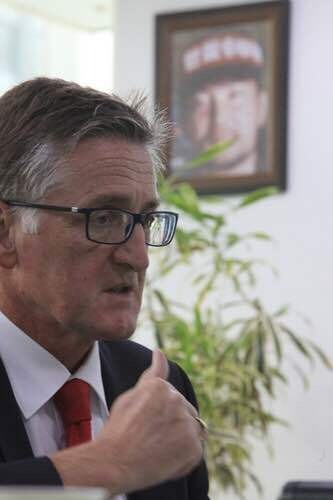hankyoreh
Links to other country sites 다른 나라 사이트 링크
Int’l union representative regrets that S. Korea has “returned to the past”

The setting was the Seoul Detention Center in the Poil neighborhood of Uiwang, Gyeonggi Province. It was around 3:50 pm on Sept. 6, and UNI Global Union general secretary Philip Jennings was meeting Korean Confederation of Trade Unions (KCTU) president Han Sang-gyun for the first time. Jennings, who had just had a 20-hour flight, pressed the palm of his hand against the barred window and called Han “brother.”
“Brother Han isn’t just the president of KCTU – he’s a president to all workers fighting throughout the world,” Jennings said.
“The international labor movement will not sleep until he is freed.”
In his remarks, Jennings was referring the agreement by the International Labour Organization (ILO), the International Trade Union Confederation (ITUC) and the OECD Trade Union Advisory Committee (TUAC) to campaign with the UNI Global Union for Han’s release. The UNI Global Union is the largest international industry union federation in the world, with around 20 million members from 900 unions in 150 countries.
But Han disagreed. “It doesn’t matter how much longer I stay in jail,” he said. Instead, he called for international support for strikes by unions in the public and financial sectors.
“This is a crucial struggle against the Park Geun-hye administration’s antiunion policies and chaebol greed,” sources quoted him as saying. “International solidarity is urgently needed.”
The Korean Public Service and Transport Workers’ Union, affiliated with KCTU, and the Korean Financial Industry Union (KFIU), affiliated with the Federation of Korean Trade Unions (FKTU), plan to launch an indefinite strike on Sept. 23 to demand the abolition of the administration’s performance-based salary system. The two men’s first meeting lasted only 10 minutes, but Jennings said he was “greatly moved by the way Han was completely unruffled by the South Korean government’s suppression.”
Jennings also pledged to share Han’s message at the IndustriALL Global Union world congress in Brazil.
“Meeting Han, I got a physical sense of how South Korea has returned to the past,” said Jennings – the UNI Global Union’s general secretary since 2000 – in an interview that day with the Hankyoreh.
He also compared the meeting to a previous one with then-KFIU president Lee Yong-deuk, who was arrested in 2001 on charges of organizing a strike to oppose the merger between Kookmin Bank (KB) and Housing & Commercial Bank. At the time, the Justice Ministry granted a special meeting, in which the two talked for about an hour. This time, Han and Jennings were only allowed 10 minutes to communicate over an old speaker, with police monitoring the meeting.
“The labor world was already shocked by the heavy sentence [five years in prison in the first trial] handed down to the KCTU president for leading a rally, but after seeing how the South Korean government has been unilaterally pushing through a performance-based pay system for the public sector without any assessment standards or consent from workers, it is no different from a dictatorship,” Jennings said.
“It’s been 20 years since South Korea joined the OECD, but democracy and basic worker rights have been regressing all the while.”
By Jung Eun-joo, staff reporter
Please direct questions or comments to [english@hani.co.kr]

Editorial・opinion
![[Column] Has Korea, too, crossed the Rubicon on China? [Column] Has Korea, too, crossed the Rubicon on China?](https://flexible.img.hani.co.kr/flexible/normal/500/300/imgdb/original/2024/0419/9317135153409185.jpg) [Column] Has Korea, too, crossed the Rubicon on China?
[Column] Has Korea, too, crossed the Rubicon on China?![[Correspondent’s column] In Japan’s alliance with US, echoes of its past alliances with UK [Correspondent’s column] In Japan’s alliance with US, echoes of its past alliances with UK](https://flexible.img.hani.co.kr/flexible/normal/500/300/imgdb/original/2024/0419/2317135166563519.jpg) [Correspondent’s column] In Japan’s alliance with US, echoes of its past alliances with UK
[Correspondent’s column] In Japan’s alliance with US, echoes of its past alliances with UK- [Editorial] Does Yoon think the Korean public is wrong?
- [Editorial] As it bolsters its alliance with US, Japan must be accountable for past
- [Guest essay] Amending the Constitution is Yoon’s key to leaving office in public’s good graces
- [Editorial] 10 years on, lessons of Sewol tragedy must never be forgotten
- [Column] A death blow to Korea’s prosecutor politics
- [Correspondent’s column] The US and the end of Japanese pacifism
- [Guest essay] How Korea turned its trainee doctors into monsters
- [Guest essay] As someone who helped forge Seoul-Moscow ties, their status today troubles me
Most viewed articles
- 1[Column] The clock is ticking for Korea’s first lady
- 2After 2 months of delayed, denied medical care, Koreans worry worst may be yet to come
- 3[Column] Has Korea, too, crossed the Rubicon on China?
- 4US overtakes China as Korea’s top export market, prompting trade sanction jitters
- 5[Editorial] When the choice is kids or career, Korea will never overcome birth rate woes
- 6[Correspondent’s column] In Japan’s alliance with US, echoes of its past alliances with UK
- 7[Photo] Smile ambassador, you’re on camera
- 8Hong Se-hwa, voice for tolerance whose memoir of exile touched a chord, dies at 76
- 9Nearly 1 in 5 N. Korean defectors say they regret coming to S. Korea
- 10Strong dollar isn’t all that’s pushing won exchange rate into to 1,400 range